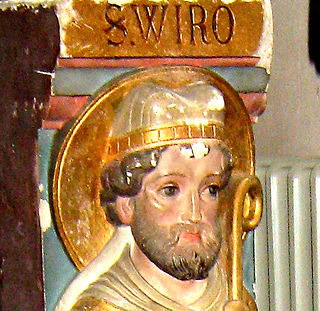Otgar or Otger is a Germanic masculine given name (from Proto-Germanic *Audawakraz). It may refer to:
Paul may refer to:
Arnulf is a masculine German given name. It is composed of the Germanic elements arn "eagle" and ulf "wolf". The -ulf, -olf suffix was an extremely frequent element in Germanic onomastics and from an early time was perceived as a mere suffix forming given names. Similarly, the suffix -wald, -ald, -old, originally from wald "rule, power" underwent semantic weakening. Therefore, the name Arnulf and Arnold were often conflated in early medieval records, as is the case with bishop Arnulf of Metz, especially as the final consonant came to be dropped (Arnoul).
Anselm often refers to Saint Anselm of Canterbury, philosopher, Abbot of Bec, and Archbishop of Canterbury.
Berengar is a masculine name derived from Germanic roots meaning "bear" and "spear". The name appears frequently among certain noble families during the Middle Ages, especially the Unruochings and those related. Bérenger is the French form, while Berengario is the Italian form, Berenguer is the Catalan form, and Berenguier or Berengier is the Occitan form. The Latin form is Berengarius and the female equivalent is Berengaria. Other forms of the name include Berenger, Bérenger, Bérangier, or Beringer.
Colmán or Colman is both a given name and a surname. Notable people with the name include:
Cosmas or Kosmas is a Greek name, from Ancient Greek Κοσμᾶς (Kosmâs), associated with the noun κόσμος (kósmos), meaning "universe", and the verb κοσμέω linked to propriety. Alternate form: Κοσμίας; female form: Κοσμώ. It may refer to:
Eustathius or Eustathios is a Greek masculine given name, in English rendered Eustace. It may refer to:
Nicetas or Niketas (Νικήτας) is a Greek given name, meaning "victorious one" . The veneration of martyr saint Nicetas the Goth in the medieval period gave rise to the Slavic forms: Nikita, Mykyta and Mikita
Enguerrand is a medieval French name, derived from a Germanic name Engilram, from Angil, the tribal name of the Angles, and hramn "raven". The Old Frankish name is recorded in various forms during the 8th to 11th centuries, the oldest attestation being Angalramnus, the name of a bishop of Metz of the 8th century; other forms include Angilrammus, Angelramnus, Ingalramnus, Ingilramnus, Ingelranmus, Engilramnus, Engilhram, Engilram, Engelram, Hengelrannus (etc.)
Benedict Levita, or Benedict the Deacon, is the pseudonym attached to a forged collection of capitularies that appeared in the ninth century.
Ælfwine is an Old English personal name. It is composed of the elements ælf "elf" and wine "friend", continuing a hypothetical Common Germanic given name *albi-winiz which is also continued in Old High German and Lombardic as Albewin, Alpwin, Albuin, Alboin. Old Norse forms of the name are Alfvin and Ǫlfun. The modern name Alwin may be a reduction of this name, or alternatively of Adalwin, the Old High German cognate of the Anglo-Saxon Æthelwine. The name of the elves is clearly of Common Germanic age. As an element in given names, it is not found in the earliest period, but it is well attested from the 6th century and extinct by the Late Middle Ages.
Osmund is a Germanic name composed of the word Os meaning "god" and mund meaning "protection." It may refer to:
Theodemir, Theodemar, Theudemer or Theudimer was a Germanic name common among the various Germanic peoples of early medieval Europe. According to Smaragdus of Saint-Mihiel, the form Theudemar is Frankish and Theudemir is Gothic.
Waleran, Galeran, or Walram is a Germanic first name, common in the Middle Ages, that may refer to:
Gundulf and its variants is a Germanic given name, from gund, "battle", and wulf, "wolf".
Sicard, Sicardo, Sicardus, Sichard or Sicart is a given name of Germanic origin. It may refer to:
Ratold, also spelled Rathold, Radolt, Ratolt or Ratoldus, is a masculine given name of Germanic origin. It is a variant of Rapoto. In Italian it is Ratoldo. It may refer to:

Wiro of Roermond, also Wiro or Wera of Utrecht is a Christian saint of the 8th century. His feast day is May 8.
Hunald, also spelled Hunold, Hunoald, Hunuald or Chunoald, is a masculine given name of Germanic origin. It may refer to:
Rostagnus is a Latinization of a Germanic given name common in the Middle Ages, especially in Occitania. It derives from Proto-Germanic *Hrōþi- "fame" and *stainaz "stone". It is attested in the Old High German form Hruodstein.